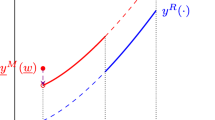Abstract
In this paper, we consider a population represented by a continuum of individuals uniformly distributed over the unit interval that faces a problem of location and financing of public facilities under the equal share rule. We examine three notions of stability of emerging jurisdiction structures (stability under unanimous consent, free mobility and core) and provide a characterization of stable structures.
Similar content being viewed by others
References
Alesina A, Spolaore E (1997) On the number and size of nations. Quart J Econ 112:1027–1056
Bogomolnaia A, Le Breton M, Savvateev A, Weber S (2005a) The egalitarian sharing rule in provision of public projects. Econ Bull 8(11):1–5
Bogomolnaia A, Le Breton M, Savvateev A, Weber S (2005b) Stability of jurisdiction structures under the equal share and median rules. CORE Discussion Paper, Econ Theory (in press)
Bogomolnaia A, Le Breton M, Savvateev A, Weber S (2006) Heterogeneity gap in stable jurisdiction structures. Mimeo
Cassela A (2001) The role of market size in the formation of jurisdictions. Rev Econ Stud 68:83–108
Cremer H, de Kerchove A-M, Thisse J (1985) An economic theory of public facilities in space. Math Social Sci 9:249–262
Dahm M, Cechlárová K, Lasko V (2001) Efficiency and stability in a discrete model of country formation. J Glob Opt 20:239–256
Drèze H, Le Breton M, Weber S (2006) Rawlsian pricing of access to public facilities: a unidimensional illustration. Mimeo
Greenberg J, Weber S (1986) Strong Tiebout equilibrium under restricted preferences domain. J Econ Theory 38:101–117
Guesnerie R, Oddou C (1979) On economic games that are not necessarily superadditive. Econ Lett 3:301–306
Jéhiel P, Scotchmer S (1997) Free mobility and the optimal number of jurisdictions. Annals d’Economie et Statistiques 45:19–231
Jéhiel P, Scotchmer S (2001) Constitutional rules of exclusion in jurisdiction formation. Rev Econ Stud 68:393–413
Haeringer G (2000) Stable coalition structures with fixed division scheme. In: Kirman A, Zimmermann J-B (eds) Lecture notes in economic and mathematical systems. Springer, Berlin New York, p 503
Haimanko O, Le Breton M, Weber S (2004) Voluntary formation of communities for provision of public projects. J Econ Theory 115:1–34
Haimanko O, Le Breton M, Weber S (2005) Transfers in a polarized country: bridging the gap between efficiency and stability. J Public Econ 89:1277–1303
Le Breton M, Weber S (2003) The art of making everybody happy: how to prevent a secession. IMF Staff Papers 50:403–435
Le Breton M, Weber S (2004) Secession-proof cost allocations and stable group structures in models of horizontal differentiation. In: Demange G, Wooders M, (eds). Group formation in economics: networks, clubs and coalitions. Cambridge University Press, Cambridge, pp. 266–285
Le Breton M, Weber S, Drèze JH (2004) The Rawlsian principle and secession-proofness in large heterogeneous societies. CORE Discussion Paper
Author information
Authors and Affiliations
Corresponding author
Additional information
Financial support for Alexei Savvateev was obtained through grants R98-0631 from the Economic Education and Research Consortium, # NSh-1939.2003.6 School Support, Russian Foundation for Basic Research No. 04-02-17227, and the Fund for Promotion of Russian Sciences is gratefully acknowledged.
Rights and permissions
About this article
Cite this article
Bogomolnaia, A., Le Breton, M., Savvateev, A. et al. Stability under unanimous consent, free mobility and core. Int J Game Theory 35, 185–204 (2007). https://doi.org/10.1007/s00182-006-0043-4
Revised:
Published:
Issue Date:
DOI: https://doi.org/10.1007/s00182-006-0043-4



